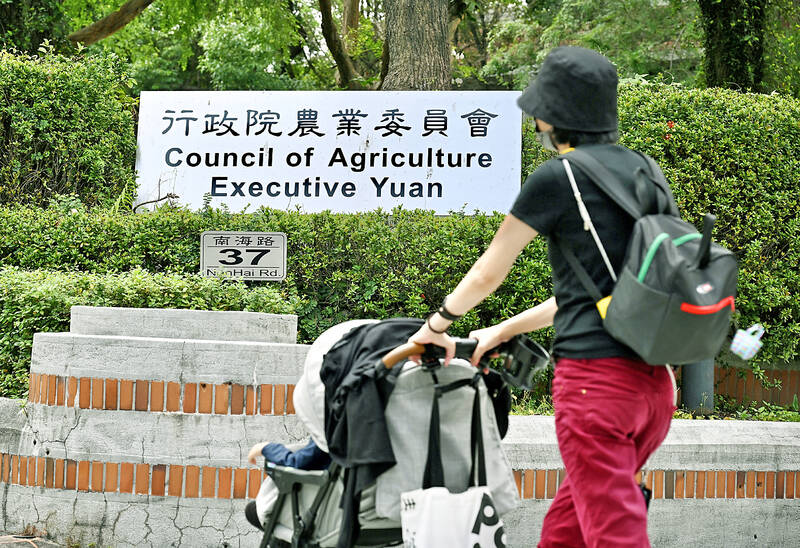The Council of Agriculture yesterday was upgraded to the status of a ministry, after the Organization Act of the Ministry of Agriculture (農業部組織法案) passed a third reading at the legislature in Taipei.
National Taiwan University Department of Agricultural Economics professor Chang Hung-hao (張宏浩) said that agricultural officials would now have more authority, and that the new ministry’s greatest challenge would be tackling import and export-related issues.
“Many matters in the agricultural field require consultation and cooperation across the economics, health and environment ministries, and now agriculture officials will be able to communicate with those ministries on an equal footing,” Chang said.

Photo: Lo Pei-de, Taipei Times
It has been 35 years since the peasant movement on May 20, 1988, when farmers protested government plans to expand imports of agricultural products from the US, he said, adding that the establishment of the Ministry of Agriculture was the most significant milestone in the industry since then.
Yen Huai-shing (顏慧欣), deputy executive director of the Taiwan WTO & RTA Center at the Chung-Hua Institution for Economic Research, said the upgraded ministry would be better able to integrate the resources of relevant government departments and would coordinate horizontally across government agencies more efficiently.
When market liberalization policies threaten farmers’ income, the ministry would be able to allocate more resources to help farmers, including assisting them to adjust their crops and make other arrangements to help them with the transition, Yen said.
“The Ministry of Agriculture will be better prepared for external negotiations and countermeasures, and it will also be able to allocate more resources to handling international affairs,” she said. “If Taiwan wants to integrate more into the regional economy, other nations will inevitably ask Taiwan to accept more imported food items.”
Importing more food items would involve more work, such as quarantine measures to prevent the import of pests and diseases, and administrative review of documents, all of which would require the greater resources of a ministry, she added.
Other areas would require more resources, too, such as cooperation between the Ministry of Agriculture and the Ministry of Health and Welfare in the field of nutrition, Chang said, adding that the new ministry would need time to acquire all of the personnel it would need for its new roles.
The legislature yesterday also passed amendments to the Organic Act of the Ministry of Transportation and Communications (交通部組織法) to elevate the status of the Tourism Bureau and the Central Weather Bureau (CWB) into departments, entitling them to a larger budget and workforce to advance their goals.
CWB Director-General Cheng Ming-dean (鄭明典) said the organizational upgrade would help the bureau expand beyond traditional weather forecasting into areas such as climate change research.
Tourism Bureau Director-General Chang Shi-chung (張錫聰) said the move would allow the bureau to hire more employees in Taiwan and internationally, and better achieve the goals laid out in the tourism policy white paper.
Additional reporting by CNA

Taiwan has received more than US$70 million in royalties as of the end of last year from developing the F-16V jet as countries worldwide purchase or upgrade to this popular model, government and military officials said on Saturday. Taiwan funded the development of the F-16V jet and ended up the sole investor as other countries withdrew from the program. Now the F-16V is increasingly popular and countries must pay Taiwan a percentage in royalties when they purchase new F-16V aircraft or upgrade older F-16 models. The next five years are expected to be the peak for these royalties, with Taiwan potentially earning

STAY IN YOUR LANE: As the US and Israel attack Iran, the ministry has warned China not to overstep by including Taiwanese citizens in its evacuation orders The Ministry of Foreign Affairs (MOFA) yesterday rebuked a statement by China’s embassy in Israel that it would evacuate Taiwanese holders of Chinese travel documents from Israel amid the latter’s escalating conflict with Iran. Tensions have risen across the Middle East in the wake of US and Israeli airstrikes on Iran beginning Saturday. China subsequently issued an evacuation notice for its citizens. In a news release, the Chinese embassy in Israel said holders of “Taiwan compatriot permits (台胞證)” issued to Taiwanese nationals by Chinese authorities for travel to China — could register for evacuation to Egypt. In Taipei, the ministry yesterday said Taiwan

POSITIVE DEVELOPMENT: Japan and the US are expected to hold in-depth discussions on Taiwan-related issues during the meeting next month, Japanese sources said The holding of a Japan-US leaders’ meeting ahead of US President Donald Trump’s visit to China is positive news for Taiwan, former Japan-Taiwan Exchange Association representative Hiroyasu Izumi said yesterday. After the Liberal Democratic Party’s landslide victory in Japan’s House of Representatives election, Japanese Prime Minister Sanae Takaichi is scheduled to visit the US next month, where she is to meet with Trump ahead of the US president’s planned visit to China from March 31 to April 2 for a meeting with Chinese President Xi Jinping (習近平). Japan and the US are expected to hold in-depth discussions on Taiwan-related issues during the

‘LIKE-MINDED PARTNER’: Tako van Popta said it would be inappropriate to delay signing the deal with Taiwan because of China, adding he would promote the issue Canadian senators have stressed Taiwan’s importance for international trade and expressed enthusiasm for ensuring the Taiwan-Canada trade cooperation framework agreement is implemented this year. Representative to Canada Harry Tseng (曾厚仁) in an interview with the Central News Agency (CNA) said he was increasingly uneasy about Ottawa’s delays in signing the agreement, especially as Ottawa has warmed toward Beijing. There are “no negotiations left. Not only [is it] initialed, we have three versions of the text ready: English, French and Mandarin,” Tseng said. “That tells you how close we are to the final signature.” Tseng said that he hoped Canadian Prime Minister Mark Carney